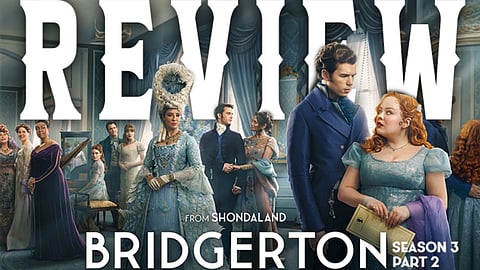Bridgerton Season 3: Part 2 Review: A shaky, yet rousing finale to the pen’s might
Bridgerton Season 3: Part 2(3 / 5)
Dearest gentle readers, we have been apart for just one month and yet, it did feel like an eternity. Ahead of Bridgerton Season 3: Part 2 premiere, social media was filled with content about the “steamy carriage scene” being rewatched multiple times and how the audience waited with bated breath with porcelain cups, for wallflowers to fully bloom, in their embellished and bejewelled gowns made with satin fabrics. The tea here is gossip and in London’s high society, gossip fuels friendships, feuds, and the absolute acceptance of the feminine power.
Showrunner: Jess Brownell
Cast: Nicola Coughlan, Luke Newton, Claudia Jessie, Golda Rosheuvel, Hannah Dodd, Adjoa Andoh, Jessica Madsen
Picking up after a rather scandalous night out, part two of the season unfolds with Penelope Featherington (Nicola Coughlan) choosing to embrace herself and her new fiance Colin Bridgerton (Luke Newton). An announcement of Colin and Penelope’s sudden engagement brings great joy to the Bridgertons, but the fire runs out too quickly as Penelope is faced with newfound fears of her identity being exposed by her closest friend Eloise (Claudia Jessie). While being on the edge all the time, Penelope knows that she is putting herself, Colin, as well as the Bridgerton and Featherington families’ reputations at risk—Full points to the makers for portraying what it feels like to get a full-blown panic attack.
The second part is meatier than the first in exploring relationships beyond friendship and heterosexual romance. We see siblings Benedict (Luke Thompson) and Eloise forging a bond closer than ever. The Featherington sisters, Prudence and Philippa, finally understand how Penelope must have felt all these years. Even Lady Danbury confronts her brother Marcus Anderson (Daniel Francis) about their sour upbringing. It is also incredibly beautiful to see daughters of the show stepping forward to resolve generational trauma by shedding any barriers that they might have with their mothers—be it Francesca making her mother understand her love for John Kilmartin or Penelope sharing her deepest feelings with her mother.
Also, it seems as though mirrors were unpaid participants in this season. It was in part one that we witnessed Mrs Mondrich (Emma Naomi) cast aside her doubts and take on her title and place in the nobility while adorning a necklace in front of the mirror. Episode six titled ‘Tick Tock’ has a similar setting where Colin and Pen look at themselves in front of a mirror, a scene that was teased through several posters. She is confronted with several emotions, which drastically change over the course of the last four episodes as she walks past these giant mirrors. Unlike other seasons, the lead woman is not portrayed as a damsel in distress—Although Kate Sharma (Simone Ashley) proved herself to be unlike any other woman in the town in season 2. England's women have always liked to swoon over the men they are courting. Except for one particular scene involving Colin, Penelope asserts her independence, proving time and again that she's capable of taking care of herself, her finances, and any crisis that unfolds in front of her. The makers could have opted to make her drastically different from who she was from the previous seasons while giving her a glow-up, but didn't, thereby underlining the innate human nature to have insecurities irrespective of growth.
Cressida Cowper (a brilliant Jessica Madsen) has proven herself again as a game-changer by placing herself in the middle of the chessboard and screaming checkmate. This shift, much like Pen and Colin's relationship, felt too easy even as the twist was seen from a mile away. It is as though a princess story cannot do without evil stepsisters and a witch-like character who threatens to ruin it all. The silver lining is how her actions play out and the reactions it evokes. As she goes through crisis after crisis, one would wonder if the glass shoe does fit. While it does beautiful justice to Penelope and her evolution, (John Glaser's exquisite costumes have been of ample help) I could not help but cringe when marriage vows are written with words like, "With my body, I worship..." and actors look at their counterparts with intense dilated pupils.
Despite trying to force Benedict's storyline into this already-stuffed narrative with a charming Lady Tilley Arnold (Hannah New), the narrative only focuses on his sexual escapades instead of exploring his sexual orientation deeper. Tilley on the other hand, is full of profound thoughts. "We preen, promenade, leaving calling cards and marry. We follow by the rules, but we don't question the meaning of it at all," she says, but her character arc leaves much to be desired. Yet, these minor inconsistencies barely affect the overall story. Colin certainly has come around to use his worldviews and the raging conflicts within himself to accept his mistakes and shed his ego.
As the show constantly reiterates the power of the written word, it feels rather strange to apply it in today’s world where those in power often seek to silence dissent. But as Penelope wielded her quill, she proved to her audience once again how, where, and which word would strike the right person and how it demands attention to pressing matters more than gossip, cleverly drawing the line between that and rumour mongering. Although it was left unexplored, it has been made clear that one cannot separate a writer from their writing. Understandably, beyond writing, every voice—be it Penelope's, Francesca's, Philipa's, or even Violet's—needs an outlet to be heard…for many Whistledowns to be seen.

